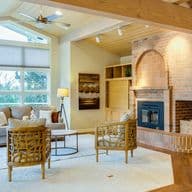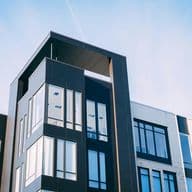
- 3 min read
Passive houses: What are they?

You may have heard the term "passive house" or "passivhaus" in recent years, but what does this term actually refer to?
Passive house or Passivhaus is a style of house construction that seeks to maximise energy efficiency and minimise energy consumption. These homes are designed to maintain a comfortable comfortable indoor environment without relying on mechanical heating or cooling systems, using solar energy insteadusing solar energy and natural ventilation instead.
Origin of passive houses
The concept of passive houses was developed in Germany in the 1990s by Dr. Wolfgang Feist and the Passive House Research Institute. Since then, it has gained popularity worldwide as a sustainable way of building housing.
Passivhaus characteristics
In the following, we will look at the defining characteristics of passive house projects:
One of the key characteristics of passive houses is their high energy efficiency. This is achieved through the use of high-density insulation, double-glazed windows and airtight sealing of construction joints. These measures help to minimise heat losses in winter and heat gains in summer.
Another important feature of Passive Houses is the natural ventilation. These houses are designed to allow fresh air in and stale air out through the use of heat recovery ventilators. This helps to maintain a cool and healthy indoor environment without relying on mechanical air conditioning systems.
In addition to their energy efficiency and natural ventilation, passive houses are also characterised by their sun-oriented design. These houses are positioned to make the most of natural sunlight during the day to illuminate and heat the interior spaces.
These are aspects that are highly valued by buyers in recent times, so it is not surprising that this type of construction is being very well received.
Advantages of passive houses over traditional constructions
One of the advantages of passive houses is that they they help to significantly reduce energy costs. By not relying on mechanical heating and cooling systems, they can save a lot of money in energy costs over their lifetime. In addition, by being more energy efficient, they also help to reduce greenhouse gas emissions and contribute to the fight against climate change. Furthermore, by using more efficient materials and technologies, passive houses can also help reduce the carbon footprint of construction.
However, building a passive house can be more expensive than building a traditional house due to the additional cost of the high-efficiency materials and technologies used. In addition to this, there are difficulties in finding qualified and experienced personnel to build passive houses.
However, this does not necessarily have to be the case, since the extra cost of the materials that must be used is amortised by the energy savings they represent. It is worth remembering that there are different government programmes that offer financial incentives for the construction of passive houses, so those interested in building a house of this type can find out more at their local council or citizens' advice bureau.
In addition, as the concept expands and becomes more popular, there will be more construction personnel qualified in this type of housing, so it will be easier to find one.
Another factor to consider is that passive houses require more attention to design and construction greater attention to design and construction to ensure that they meet energy efficiency standards. It is important to work with professionals trained and experienced in passive house construction to ensure that these standards are met.
Overall, despite all of these challenges, Passive Houses are an excellent option for those looking to build a sustainable and energy efficient home. Although they can be more expensive to build than traditional homes, the additional expense is offset by the energy savings.
You may also be interested in
 How to organise a move step by step: checklist, procedures and essential tips
How to organise a move step by step: checklist, procedures and essential tips Mistakes when selling your home: the most common errors and how to avoid them
Mistakes when selling your home: the most common errors and how to avoid them What the ITE is and why it’s key when buying or selling a property
What the ITE is and why it’s key when buying or selling a property Why rent out my flat through an estate agency
Why rent out my flat through an estate agency Buying a second home: a complete guide to making the right decision
Buying a second home: a complete guide to making the right decision Short-term rental registration in Spain: regulations and requirements
Short-term rental registration in Spain: regulations and requirements Rent to own: how it works and what you need to know
Rent to own: how it works and what you need to know Tips before renting an apartment: everything you need to know before signing
Tips before renting an apartment: everything you need to know before signing
FOR MORE INFORMATION
Contact us



Engel & Völkers Spain
Avenida Diagonal 640, 6B
08017 Barcelona, España
Tel: +34 900 747 281